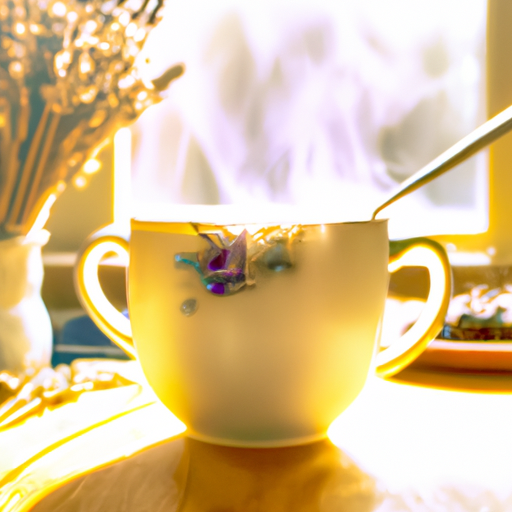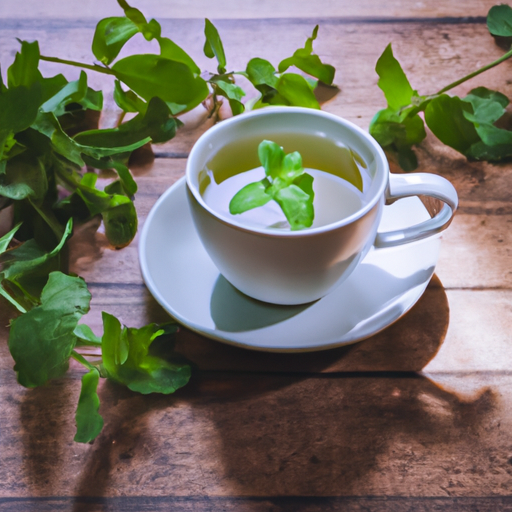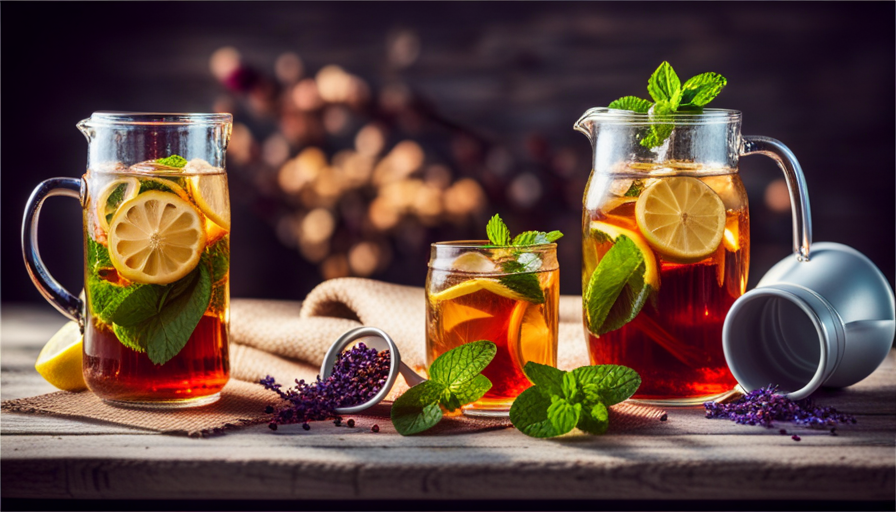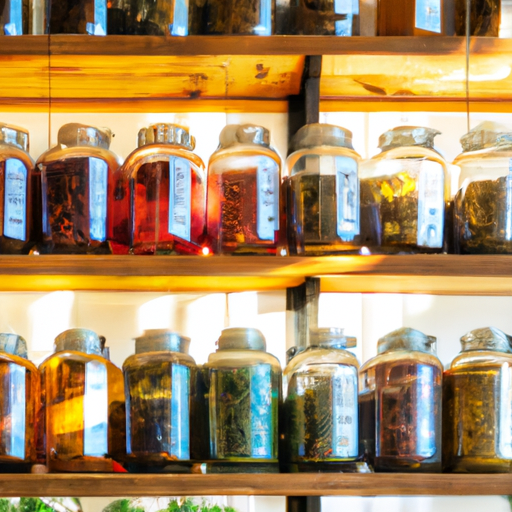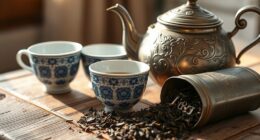As a passionate tea lover, it is important to remember that moderation is key when it comes to herbal tea. While herbal tea offers incredible health benefits, drinking too much can have negative effects on your health. Just like the saying goes, too much of a good thing can be bad for you.
In this article, we’ll explore the potential side effects of overindulging in herbal tea, as well as provide practical tips for enjoying it responsibly. So, grab your favorite mug and let’s delve into the world of herbal tea, discovering how to reap its benefits while avoiding any unwanted consequences. Remember, too much of a good thing can tip the balance, so let’s find the right equilibrium for a truly enjoyable tea experience.
Key Takeaways
- Excessive consumption of herbal tea can lead to dehydration, upset stomach, interference with medications, and interference with nutrient absorption.
- Herbal teas with diuretic properties can cause dehydration, while excessive caffeine intake from herbal teas can have negative health effects.
- Herbal teas can interact with certain medications and reduce their effectiveness.
- It is important to consume herbal tea in moderation and choose high-quality teas from reputable brands for responsible enjoyment.
The Benefits of Herbal Tea
You’ll love how herbal tea enhances your overall well-being, leaving you feeling refreshed and rejuvenated.
Herbal tea has numerous benefits that make it a popular choice among health-conscious individuals. One of the key benefits of herbal tea is its ability to boost the immune system. Certain types of herbal tea, such as echinacea or elderberry, are known for their immune-boosting properties.
Additionally, herbal teas can help with digestion and relieve bloating or indigestion. Chamomile tea, for example, is often used to soothe an upset stomach.
Another benefit of herbal tea is its calming effect on the mind and body. Types like lavender or lemon balm can help reduce stress and promote relaxation.
However, it’s important to note that excessive consumption of herbal tea can have potential side effects, which we will explore in the next section.
Potential Side Effects of Excessive Consumption
Excessive consumption of herbal tea can have potential side effects that should not be overlooked. One of these side effects is dehydration, as herbal teas have diuretic properties that can increase urine production and lead to fluid loss.
Additionally, drinking too much herbal tea can cause an upset stomach, as certain herbs may irritate the digestive system.
Lastly, it’s important to be aware that herbal teas can interfere with certain medications, reducing their effectiveness or causing unexpected interactions.
Dehydration
Feeling parched after indulging in copious amounts of herbal tea is like wandering through a desert without a single oasis in sight. While herbal tea can be a refreshing and hydrating beverage, excessive consumption can actually lead to dehydration.
This may seem counterintuitive, as herbal tea is made with water. However, many herbal teas have diuretic properties, meaning they can increase urine production and cause the body to lose more water. Additionally, some herbal teas, such as those containing caffeine or certain herbs, can have a mild laxative effect, further contributing to fluid loss.
To prevent dehydration, it’s important to balance your herbal tea intake with adequate water intake. Remember to drink plenty of plain water throughout the day to replenish lost fluids.
In the next section, we will explore the potential impact of excessive herbal tea consumption on the stomach.
Upset Stomach
When consumed in large quantities, herbal tea can potentially lead to an upset stomach due to its diuretic and laxative properties. This can result in digestive discomfort, causing symptoms such as bloating, abdominal pain, and diarrhea. Nausea and vomiting may also occur as the body tries to expel the excess tea.
To alleviate these symptoms, it’s recommended to limit your intake of herbal tea and drink it in moderation. Additionally, choosing herbal teas that are gentle on the stomach, such as chamomile or peppermint, can help prevent stomach upset. However, if you experience persistent or severe symptoms, it’s important to consult a healthcare professional as it may indicate a more serious underlying condition.
Moving forward, let’s explore how excessive herbal tea consumption can interfere with medications.
Interference with Medications
Be cautious with herbal tea if you’re taking medication, as it can potentially interact with your prescriptions and compromise their effectiveness, leaving you vulnerable to potential health risks.
Herbal teas, although natural, contain active compounds that can interfere with the absorption, metabolism, and elimination of certain medications. For example, St. John’s wort, often found in herbal teas, can interact with antidepressants, birth control pills, and blood thinners. Additionally, herbal teas can also interact with other supplements you may be taking, such as vitamins and minerals.
It’s important to consult with your healthcare provider before adding herbal teas to your daily routine to ensure they won’t negatively impact your medications. Furthermore, certain herbal teas, like hibiscus tea, can have effects on blood pressure, so it’s crucial to monitor your blood pressure levels if you’re already on medication for hypertension.
Understanding caffeine content in herbal teas is another important factor to consider, which we’ll explore in the next section.
Understanding Caffeine Content
When it comes to herbal teas, it’s important to understand the different types and their caffeine levels.
Some herbal teas, like chamomile and peppermint, are naturally caffeine-free, making them a great choice for those looking to limit their caffeine intake.
However, other herbal teas, such as black tea or yerba mate, contain caffeine and should be consumed in moderation to avoid the potential negative effects of excessive caffeine intake.
Different Types of Herbal Teas and Their Caffeine Levels
Explore the diverse world of herbal teas and discover their varying caffeine levels, allowing you to savor the perfect cup without worrying about excessive consumption. Here are four types of herbal teas that are caffeine-free and perfect for relaxation:
-
Chamomile Tea: Known for its calming properties, chamomile tea is caffeine-free and can help promote relaxation and reduce anxiety.
-
Peppermint Tea: With its refreshing and soothing flavor, peppermint tea is caffeine-free and can aid in digestion and provide relief from headaches.
-
Rooibos Tea: Originating from South Africa, rooibos tea is naturally caffeine-free and is rich in antioxidants, making it a great choice for promoting overall health and well-being.
-
Lemon Balm Tea: Lemon balm tea is caffeine-free and has a citrusy flavor that can help reduce stress and promote relaxation.
With these caffeine-free herbal teas, you can enjoy a calming and soothing experience without the worry of excessive caffeine intake. Transitioning to the subsequent section, let’s now explore the effects of excessive caffeine intake.
Effects of Excessive Caffeine Intake
Indulging in excessive caffeine can feel like a roller coaster ride for your body, with your heart racing and your mind buzzing like a swarm of bees. While herbal teas generally have lower caffeine levels than other types of tea, consuming too much can still have negative effects.
One of the main concerns is caffeine withdrawal. When you drink excessive amounts of herbal tea, your body can become dependent on the caffeine, leading to withdrawal symptoms like headaches, irritability, and fatigue when you try to cut back.
Additionally, long-term excessive caffeine intake can have various health effects, including increased heart rate, high blood pressure, and disrupted sleep patterns. It’s important to be mindful of your caffeine intake and listen to your body’s signals.
Transitioning into the subsequent section, moderation is key to maintaining a healthy balance.
Moderation is Key
To maintain a healthy balance, remember that you should be mindful of the amount of herbal tea you consume. Portion control is key when it comes to enjoying herbal tea responsibly. While herbal tea is generally considered safe, excessive intake can lead to unpleasant side effects. It’s important to find balance in consumption to avoid issues such as digestive problems, insomnia, and increased heart rate.
Too much herbal tea can also interfere with nutrient absorption and cause dehydration. So, it’s best to enjoy herbal tea in moderation.
In the next section, we’ll discuss some tips for enjoying herbal tea responsibly, which’ll help you make the most of this soothing beverage without overdoing it.
Tips for Enjoying Herbal Tea Responsibly
When it comes to enjoying herbal tea responsibly, there are three key points to consider: choosing high-quality herbal teas, using proper brewing techniques, and pairing it with healthy snacks.
First and foremost, it’s important to select herbal teas that are sourced from reputable brands and made from high-quality ingredients to ensure maximum flavor and health benefits.
Secondly, mastering the art of proper brewing techniques, such as steeping the tea for the right amount of time and at the correct temperature, will result in a delicious and satisfying cup of herbal tea.
Lastly, pairing herbal tea with nutritious and wholesome snacks, like fruits or nuts, can enhance the overall experience and provide a balanced and enjoyable refreshment.
Choosing High-Quality Herbal Teas
Sipping on a cup of high-quality herbal tea is like embarking on a fragrant and invigorating journey. The key to enjoying the best herbal teas lies in the use of high-quality ingredients and proper steeping methods. When choosing herbal teas, look for reputable brands that prioritize sourcing organic and sustainably grown herbs. These teas are often made with whole leaves and flowers, ensuring a rich and robust flavor. Additionally, paying attention to the steeping method is crucial. Different herbs require different steeping times and water temperatures to extract their full potential. To help you choose the right brewing technique, refer to the table below:
| Herb | Steeping Time | Water Temperature |
|---|---|---|
| Chamomile | 5-7 minutes | 200°F |
| Peppermint | 3-5 minutes | 212°F |
| Rooibos | 5-7 minutes | 212°F |
| Lavender | 3-5 minutes | 195°F |
By understanding these nuances, you can ensure that each cup of herbal tea is brewed to perfection, enhancing its flavor and therapeutic benefits. Now, let’s delve into the proper brewing techniques to elevate your herbal tea experience even further.
Proper Brewing Techniques
Brewing herbal tea is like orchestrating a delicate dance of flavors and aromas, where each step is crucial to creating a truly enchanting experience. To ensure the perfect cup of herbal tea, here are some key elements to consider:
-
Proper brewing time: Steeping your herbal tea for the right amount of time is essential to extract the desired flavors. This can vary depending on the type of herbal tea, but a general guideline is to steep for 5-7 minutes.
-
Recommended water temperature: The ideal water temperature for brewing herbal tea is around 200°F (93°C). This temperature allows the herbs to release their flavors without becoming bitter.
-
Use a tea infuser or strainer: To prevent any loose herbs from ending up in your cup, it’s best to use a tea infuser or strainer. This will ensure a smooth and enjoyable tea-drinking experience.
-
Allow the tea to cool: After brewing, give your tea a few minutes to cool down before enjoying. This will allow the flavors to develop fully and prevent any scalding accidents.
By following these brewing techniques, you can create a perfect cup of herbal tea that’ll pair beautifully with healthy snacks, enhancing your overall tea-drinking experience.
Pairing with Healthy Snacks
Enhance your tea-drinking experience by pairing your enchanting cup of herbal tea with a delightful array of healthy snacks, creating a harmonious symphony of flavors. Not only does this combination satisfy your taste buds, but it also provides numerous nutritional benefits. Incorporating healthy snacks into your tea time can boost your energy levels, aid digestion, and promote overall well-being. To help you make the most of your tea and snack pairing, consider these flavorful combinations:
| Herbal Tea Flavor | Healthy Snack Option | Benefits |
|---|---|---|
| Chamomile | Sliced apples with almond butter | The calming effects of chamomile tea combined with the natural sweetness of apples and the protein-rich almond butter provide a soothing and satisfying snack. |
| Peppermint | Greek yogurt with fresh berries | Peppermint tea’s refreshing taste pairs perfectly with the tangy yogurt and antioxidant-packed berries, creating a refreshing and nutritious snack. |
| Ginger | Carrot sticks with hummus | The spicy kick of ginger tea complements the earthy flavor of carrots, and when paired with protein-rich hummus, it becomes a satiating snack that aids digestion. |
By exploring these flavor combinations, you can elevate your tea experience while reaping the nutritional benefits. Transitioning into the subsequent section about ‘herbal tea alternatives,’ let’s explore other options to expand your tea-drinking repertoire.
Herbal Tea Alternatives
Looking for a comforting and healthy alternative to herbal tea? There are several herbal tea alternatives that offer similar health benefits.
One option is green tea, which’s rich in antioxidants and can boost metabolism.
Another option is chamomile tea, which has calming properties and can help with sleep.
Peppermint tea’s a great choice for digestion and can soothe an upset stomach.
Rooibos tea is caffeine-free and packed with antioxidants, making it a good choice for overall health.
Finally, ginger tea is known for its anti-inflammatory properties and can help with digestion and nausea.
These herbal tea alternatives provide a range of health benefits and can be enjoyed as part of a balanced diet.
Transitioning into the next section, it’s important to enjoy herbal tea in moderation to avoid potential negative effects.
Conclusion: Enjoying Herbal Tea in Moderation
To ensure you experience the full benefits of herbal tea, it’s important to savor it in moderation, allowing the warm and soothing flavors to gently envelop your senses.
While herbal tea offers numerous health benefits, overconsumption can have adverse effects on your health. Drinking excessive amounts of herbal tea can lead to potential long-term health risks. Some herbal teas contain compounds that may interact with medications or have a diuretic effect, which can cause dehydration if consumed in excess.
Additionally, certain herbal teas contain high levels of certain compounds, such as caffeine or tannins, which can have negative effects on the body if consumed in large quantities. Therefore, it’s crucial to enjoy herbal tea in moderation to reap its benefits without risking any potential health issues.
Frequently Asked Questions
Can herbal tea really have side effects if consumed in excess?
Drinking excess herbal tea can have side effects like any other substance. While herbal tea benefits include relaxation and antioxidant properties, it’s important to be mindful of potential risks such as digestive issues or interactions with medication.
How much caffeine is typically found in herbal teas?
Herbal teas are generally caffeine-free, making them a great choice for those looking to limit their caffeine intake. While caffeine content may vary, most herbal teas provide numerous health benefits without the jitters or sleep disturbances associated with excessive caffeine consumption.
What are some signs or symptoms of excessive consumption of herbal tea?
Excessive consumption of herbal tea can lead to disrupted sleep patterns and long-term health issues. It may cause symptoms such as insomnia, increased heart rate, digestive problems, and dehydration.
Are there any herbal tea alternatives that are safer to consume in large quantities?
Safer alternatives to herbal tea in large quantities include green tea and white tea. While herbal teas have potential risks, these alternatives offer health benefits without the same concerns.
Are there any specific tips or guidelines for consuming herbal tea responsibly?
Responsible consumption guidelines for herbal tea include limiting intake to a few cups daily, considering individual sensitivities or allergies, and avoiding excessive caffeine. Potential health benefits include improved digestion, stress relief, and antioxidant support.
Conclusion
In conclusion, herbal tea is a wonderful beverage that offers a range of health benefits. However, like anything, moderation is key. As I’ve learned from personal experience, drinking too much herbal tea can lead to some unwanted side effects. It’s like indulging in your favorite dessert – a little bit’s enjoyable, but too much can leave you feeling sick. So, remember to enjoy your herbal tea responsibly and listen to your body’s signals. As they say, everything in moderation, including herbal tea!


